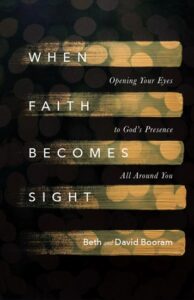 Summary: Beth and David Booram present spiritual direction as a method of discipleship to an Evangelical audience.
Summary: Beth and David Booram present spiritual direction as a method of discipleship to an Evangelical audience.
I am halfway through a program to become a spiritual director. It is a program rooted in Ignatian theory, as is the Boorams. As I have been in my program, I have been intentionally seeking out Protestant or Evangelical books with similar content to the (Catholic) Ignatian perspectives to help me often understand subtle differences in language or approach that I am blind to. When Faith Becomes Sight, I think, is the best overview of Ignatian spiritual direction that I have read for an Evangelical audience.
The rough structure of When Faith Becomes Sight is to start first by recognizing the signs of God that are already around us. This approach begins with the assumption that God seeks to communicate with you personally (not individually, but personally.) Signs of God are often subtle, and in a loud world with little silence, we need to develop skills to see and listen. Once we start seeing the signs of God around us, we need to develop skills of discernment, which requires examining our conscious and unconscious understanding of God. The book’s final section is more directly about the tools of spiritual direction and the lifelong process of discipleship.
When Faith Becomes Sight uses their work as spiritual directors (and their personal history) as examples of what discipleship looks like. As I glanced through some reviews, I saw that some people objected to their retelling of scripture. Retelling or immersion in scripture is part of the Ignatian practice of absorbing scripture and then retelling it in ways that the scripture speaks to you. That does not mean that the retellings are the same as scripture; we are always limited in our perspective, and often, in trying to make a point, we can distort a passage. That is not a reason to not deeply explore scripture, but instead, it is a reason to develop discernment about how we read scripture and theologically approach the world. And for those still skeptical, sermons explicate scripture, not merely read the scripture and sit down. Retelling scripture in your own words is very similar in purpose.
Part of the assumption of Ignatian spiritual direction is that a God will speak, and we can understand. Not necessarily in vocal words, but it may be vocal. The point is that Ignatius and many other streams of spiritual direction assume that the Holy Spirit can and will communicate his direction to us. And while we may not be perfect in understanding, with help, we can make a reasonable attempt at discerning God from our desires, sins, and satanic interruption.
There is a stream of Christianity that is overtly resistant to this type of hearing from God, and I honestly do not know what to do with this type of resistance. Throughout Christian history, the stories of saints and leaders have been a story of God’s direction. My one complaint and it is a complaint about much of the Evangelical world, as well as some within the spiritual direction world, is that we are never Christians on our own. Spiritual Direction can sometimes be thought of as equipping the individual for spiritual growth. In my post on All That’s Good: Recovering the Lost Art of Discernment by Hannah Anderson, I noted that the Catholic book Weeds Among the Wheat (also about discernment) is more oriented toward learning discernment in community and having a “Co-discerner” of the call of the Holy Spirit speaking within them.” Similarly, The Examen Prayer by Timothy Gallagher talks about the importance of not just doing the examen as an individual but having a spiritual director or another person to help work through the results and process of the examen so that you are int just an individual. And all of this assumes that we are somehow connected to a church body.
I am increasingly convinced that spiritual direction (or something similar) is essential to being a Christian and discipleship. Our conversion may be through mass evangelism, but we do not grow through mass discipleship; we grow through individualized discipleship. (Not through individualism, but through a mode of discipleship that takes our individual needs, gifts, and situations seriously.) So, while I do not think every Christian has to have a spiritual director, I believe everyone needs a community and probably a specific individual that helps them explore their spiritual lives for growth.
When Faith Becomes Sight: Opening Your Eyes to God’s Presence All Around You by Beth and David Booram Purchase Links: Paperback, Kindle Edition, Audible.com Audiobook
I want to ask you to clarify this from your second paragraph:
“communicate with you personally (not individually, but personally)”
I doubt I am understanding your intended distinction between “individually” and “personally.” I believe I appreciate that something communicated individually may not be personal, but something personal must necessarily be communicated individually – doesn’t it?
That is not as clear as it should have been. What I was trying to communicate was that while God does communicate to us personally, but that we do not have individualistic (only Me and God) ways to discern and respond.
Some spiritual direction practice encourages just thinking about spiritual growth and discipleship as an indivdiualistic activity, but I think more healthy spiritual direction practice takes account of the spiritual community around the individual.
Thank you – that helped!